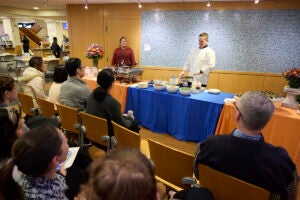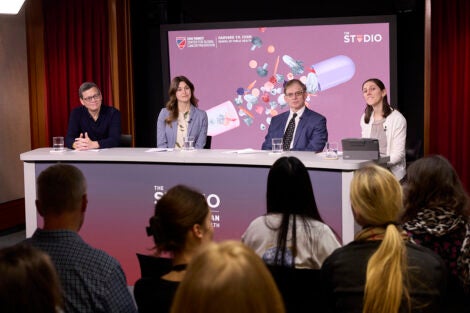February 7, 2024 — Research suggests that nearly a quarter of new cancer cases could be prevented with better nutrition. In recognition of World Cancer Day, the Harvard Chan Studio held a panel discussion on February 5 in which experts debunked cancer misinformation and offered science-based dietary tips.
The live broadcast featured Edward Giovannucci, professor of nutrition and epidemiology at Harvard T.H. Chan School of Public Health; Eliza Leone, registered dietitian and wellness manager at Restaurant Associates, Harvard Medical School; and Timothy Rebbeck, Vincent L. Gregory, Jr. Professor of Cancer Prevention at Harvard Chan School and director of the Zhu Family Center for Global Cancer Prevention. The panel was moderated by Gabrielle Emanuel, senior health and science reporter at WBUR.

The panelists began by discussing the components of a healthy diet. Giovannucci suggested that people starting to make dietary changes focus on consuming healthier proteins, fats, and carbohydrates. He defined these as lean meats and plant-based proteins like legumes; plant-based fats such as avocados and olive oil; and whole grains, vegetables, and fruits. He and the other panelists recommended avoiding highly processed foods.
This type of dietary pattern helps manage blood lipids, cholesterol, and glucose, in addition to helping keep weight at a healthy level. Giovannucci said that these are the mechanisms by which healthy diets help reduce heart disease and type 2 diabetes risk. He said that while there has been less research on diet and cancer, risk is likely affected by some of the same mechanisms.
Chronic inflammation may be another important way that diet impacts cancer risk, Giovannucci and Rebbeck said. Diets high in sugar, refined carbs, and processed foods can trigger chronic inflammation throughout the body. This can affect levels of insulin and a hormone called insulin-like growth factor (IGF). As Giovannucci explained, IGF “tells the cells that there’s a lot of nutrients around, so they keep growing.” This increases cell proliferation—and the chance of a mutation that will lead to a cancer.
Rebbeck, who oversees the Cancer FactFinder website, was asked about cancer-related myths he’d like to debunk. He noted that social media is awash in mis- and disinformation, but the most dangerous types of posts to watch out for are those that suggest replacing well-established, scientifically determined treatments with “magic pills”—for example, taking a supplement in place of chemotherapy.
When it comes to vitamin supplements taken to help fill in dietary gaps, Giovannucci said that there is some evidence that multivitamins may help reduce cancer risk. Folate, folic acid, and vitamin D in particular may be beneficial. However, he added, people should avoid taking vitamins in very high doses.
Panelists also addressed alcohol’s effect on cancer risk. “People don’t like to hear this message, but alcohol is a carcinogen,” Rebbeck said. “My read of the literature is that there is no safe level of alcohol consumption.” He noted that avoiding all risk is a hard way to live, and people have to make judgements about their personal risk calculus.
Giovannucci said that there does seem to be some benefit to diabetes and cardiovascular risk reduction from moderate drinking. However, he said that someone looking to reduce their cancer risk might want to avoid alcohol.
Leone’s top suggestions for people who want to improve their diets are to get comfortable in the kitchen and to explore different ways of cooking vegetables—for example, roasting broccoli instead of steaming it.
She noted that nutrition information can be overwhelming and making dietary changes can be difficult. “Just start somewhere,” she said. “Pick one thing that is achievable for you and do that.”
Photos: Kent Dayton
Read Harvard Gazette coverage: How to shrink the cancer risk in your diet
Read Harvard Magazine coverage (including recipes): How to Prevent Cancer through Nutrition
